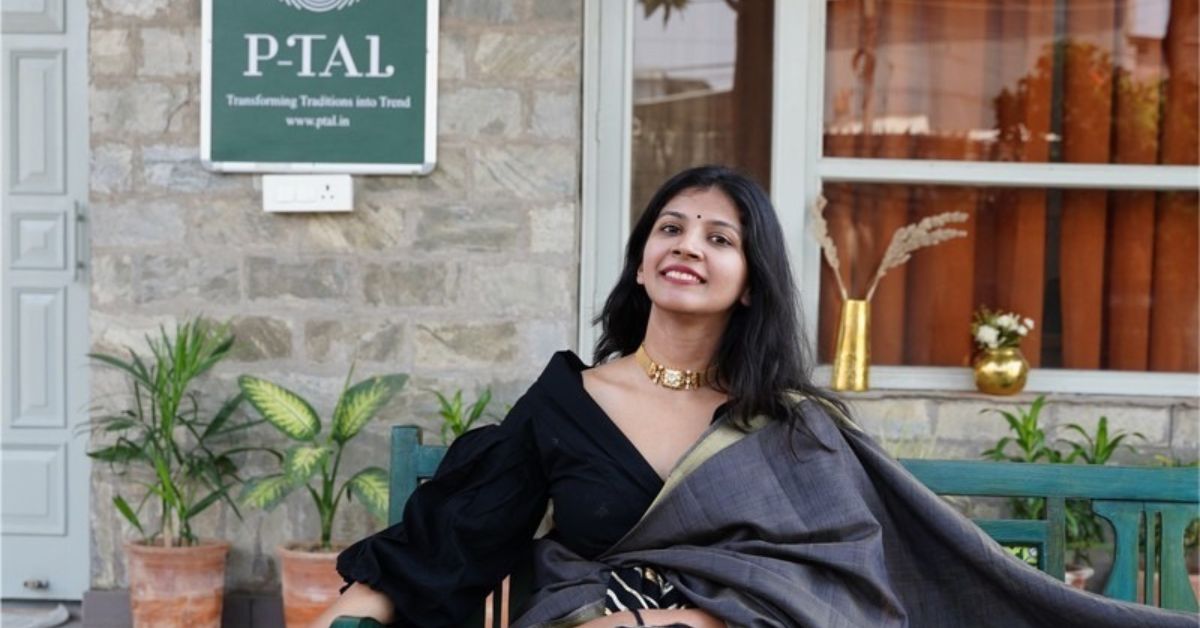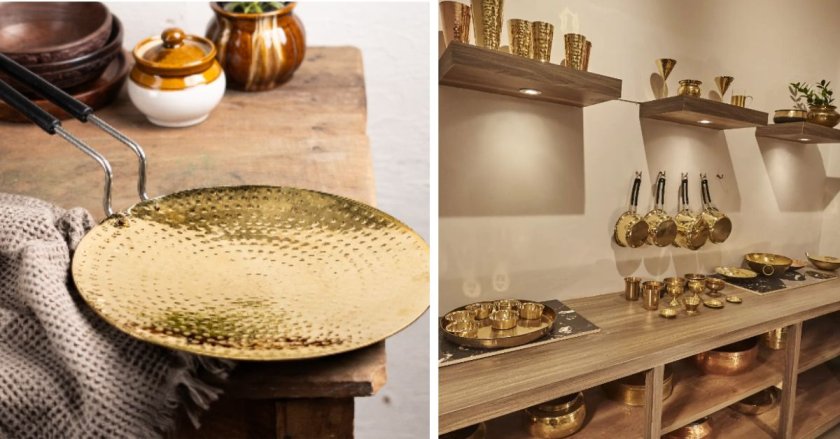Many people find their calling early in life and remain dedicated to their childhood dreams of becoming doctors, teachers, and more. However, for some, discovering their passion takes time and multiple attempts. This was true for Kirti Goel.
In many life decisions, teachers and mentors play a crucial role in shaping our paths. For Kirti, a teacher’s suggestion to explore something artistic set her on a journey that eventually led her to head a multi-crore company — contributing to preserving a dying art form while supporting a community of artists and craftsmen.
Today, Kirti, 28, is the founder of ‘P-TAL’ — an Amritsar-based business that sells traditional handcrafted kitchenware, dinnerware, and tableware made of brass, copper, and bronze.
“The brand is not just about kitchenware; it is also dedicated to helping the Thathera community preserve the art of making these utensils,” Kirti tells The Better India. Her company recently featured on Shark Tank India, where she was able to bag an ‘all-shark’ deal!
Here is the story of finding her passion in life.
A simple suggestion
“For me choosing a career path was quite difficult. Most of my friends were going to opt for engineering and so did I. But soon enough, I understood that it was not for me. However, I was sure about one thing — I wanted to do something different,” says Kirti.
That’s when a teacher suggested that she try something more artistic and go for designing. “I’m not sure why, but when she suggested it, I felt like maybe it was indeed worth a try. So, I decided to apply to Pearl Academy. Luckily, I got in, and it paved the way forward for me,” she says. “I started to think more creatively and feel that I was where I belonged.”
During her second year in training, she worked on a project based on Indian crafts. “I got to work with Chamba Rumal (an embroidered handkerchief with detailed patterns in bright and pleasing colour schemes) artists, and it was a riveting experience. I was pleasantly surprised at how rich the handmade crafts of India are,” she says.

Looking back, Kirti feels that the project was the key foundation stone that paved her path for P-TAL. “I started to research more crafts and came to know about the UNESCO-certified craft, Thathera. The art, I found, was disappearing as there was not much demand in the market for it or so was the general notion,” she informs.
Thathera craft involves making traditional brass and copper kitchen utensils by hand. The word ‘thathera’ means ‘the beater’, describing the act of beating the metal to transform it into desired shapes.
Learning about the craft motivated me to do something about it. “I was good at my academy but I knew that the fashion market was highly saturated. Additionally, it was also a matter of pride for me to save the dying art of my country. So, I took a leap of faith and lunged into starting P-Tal,” she says.
P-TAL was founded in 2016. Talking about what went behind it, she says, “First things first, I got started on the market research and kept going back and forth with consultants and product designers to understand what the consumer needs.”
Connecting with craftspersons and reviving the art
There was a perception in the market that the artisans would be hard to find as most of them had switched careers, shares Kirti.
“As we delved deeper, we discovered that this craft isn’t confined to just one location. In Jaipur, Moradabad, Lucknow, and Dehradun, there are Thatheras. Once, every village had artisans crafting brass and copper utensils. However, many shifted to producing aluminium items as brass and copper became more expensive and demand declined. The artisans struggled to innovate with these materials, leading to a decline in the traditional craft,” she adds.
She continues, “Finding artisans and understanding their needs wasn’t difficult. We identified artisans and collaborated with them.” Working with P-TAL has since significantly improved their earnings from about Rs 20 per hour to Rs 150 per hour, she further informs.
Describing his work before collaborating with P-Tal, Mandeep Singh (35) says, “We used to do a lot of hard work. The art is a complex process that involves a great deal of skilled handiwork, but many people do not understand its value. Declining sales led to less and less work each year. We didn’t want our children to follow in this trade.”
However, things took a positive turn three years ago when P-Tal approached him. “Now, we have work 365 days a year. P-Tal has been dedicated to revitalising the art, which has led to a shift towards using copper and brass. As a result, we have more clients and are earning better. If our children want to learn the art now, we would encourage them, as it is now more financially stable than ever,” he adds.

“I observed the artisans’ work and how they were making utensils, and I realised something important: when you need to innovate a craft, you have to immerse yourself in it completely,” Kirti says.
Having previously worked with craft clusters, she understood the process of collaborating with artisans. “When I started working with them and learned about their skills, I realised that I had to adapt to their expertise to develop new products. One of our first new designs was a parat (a traditional flat, round utensil). We simply added a clock to the back of the parat, making it a functional and decorative piece. This design was easy for them to make because they were already accustomed to crafting parats for us,” she says.
Recalling the initial days of her product making, she says, “It was very interesting for me as a designer to work with their skills, understand the market, and create something in collaboration that the market needed. There was a lot of learning and unlearning involved.”
Kirti says the products started to gain popularity after the COVID-19 pandemic hit and people started to turn towards traditional and sustainable products.
“We attended exhibitions and gathered customer feedback. Through conversations and our experiences, we realised that during our first year, people didn’t fully understand our products. However, after about two and a half years, we began to notice a genuine interest in purchasing our cookware,” she says.
Currently, the company produces over 80 types of products in kitchenware, dinnerware and tableware — such as parats (a flat plate-like utensil used to kneed dough), drinking glasses, tumblers, brass ladles, copper baking trays, etc.
The company collaborates with about 50 families of artisans and sources their products. “We place orders with the artisans, and once the items are completed, we procure them. Depending on the volume of work, a craftsperson working with us can earn between Rs 25,000 and Rs 50,000 a month,” says Kirti.
She adds that their major customer base is South India in states like Maharashtra and Karnataka.
The company currently earns a turnover of Rs 36 crore per annum. Looking back at her journey, she says, “While I was not sure for a very long time what I wanted to do, I was sure that I wanted to do something out of the ordinary. I tried to understand the market and took note of where it was saturated and where it needed more hands. I found a side where not many people had looked before and jumped on the wagon.”
You can buy P-TAL products here.
Edited by Pranita Bhat; All Images Credit: P-TAL
No comments:
Post a Comment